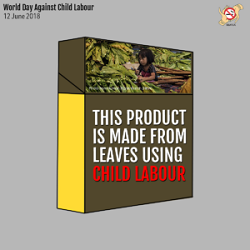The International Labour Organization (ILO) must prioritize protecting children over continuing to accept funding from the tobacco industry, which exploits farmers and their children while producing products that kill, according to a piece by Mary Assunta of the Southeast Asia Tobacco Control Alliance posted on the British Medical Association’s Tobacco Control Blog.
Such action could be postponed no longer, she said.
Today is World Day Against Child Labour, and Assunta dedicated her piece to the ‘millions of children trapped in child labour’. ‘It is a reminder that in the 21st century we have failed our children miserably, otherwise there would not be 152 million children working, many full-time,’ she said.
Assunta said that transnational tobacco companies (TTC) and international leaf traders profited from cheap leaves produced in low-income countries using child labour.
And while about US$15.4 million in industry funding had been given to the ILO, ostensibly to address child labour in six tobacco growing countries, these programs – part of the TTC’s corporate social responsibility (CSR) programs – did little to solve the deeply-entrenched problems farmers faced, which were linked to the industry itself.
The World Health Organization’s Framework Convention on Tobacco Control (FCTC) called on Parties to ban such tobacco related CSR activities, and the ILO remained the only UN agency still collaborating with the tobacco industry.
‘Tobacco industry sponsored programs do little to curb child labour in tobacco farms because they do not improve the tobacco industry-driven cycle of poverty for tobacco farmers, such as low leaf prices and unfair contracts, that forces children into the fields,’ Assunta said.
Profiting from child labor

